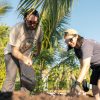The hum of the Eckerd College Community Farm sounds a little different this semester. With less shoveling and more engine rumble, thanks to their new Mahindra tractor, students can trade pitchforks for power—allowing the farm to find new, efficient ways to increase productivity.
“We had a tractor, but it was a walk-behind tractor that we didn’t really ever use,” explains David Himmelfarb, Ph.D., faculty director of the Community Farm, instructor of environmental studies and internship coordinator. “Over the last couple of years, Farmer Maggie Jensen ’11 has been looking into alternatives that we could use in a variety of different ways.” Jensen manages the farm that grew from the Garden Club she had helped found 15 years ago when she was an Eckerd student.
This new machine is a game-changer, moving thousands of pounds of food waste and compost each month. “Our intent here is that it has a really great mowing function, so it helps us maintain the grounds, especially the food-forest area,” Himmelfarb says. “But importantly, it has a front lifter that will enable us to use the tractor to turn compost.”
Until now, composting was an entirely manual process. “We’ve been doing it by hand with, like, three or four thousand pounds of food waste, plus an equal amount of mulch every month,” Himmelfarb adds. “That has absorbed so much of our time and energy.”
The tractor’s addition, he explains, will “revolutionize our composting program,” freeing up the farm crew for other vital work. “Because we collect a lot of postconsumer waste from the cafeteria, things get kind of nasty pretty fast. So the less time we can put into having people shovel that stuff, the better.”
The farm’s composting efforts are also supporting and collaborating with Feed St. Pete, a local organization that distributes food for those in need.
“We pick up food from Feed St. Pete that they are not able to distribute,” Himmelfarb explains. It’s usually things that are slightly spoiled or, for whatever reason, past the regulations that they can’t give out.
Two seniors, environmental studies and literature student Calli Marshall and environmental studies student Madison Prikryl, have been leading the charge. “They’ve been picking up hundreds of pounds of food that we then started to incorporate into the compost,” Himmelfarb says. “None of that would be possible without their creativity and thinking about how to make that happen, and the new tractor facilities enable us to do higher volume.”
The new farm equipment also enables students to become tractor certified.
“We’re really careful on the farm with any kind of new implements or tools that could potentially be dangerous, to make sure everybody has all the training they need to do it completely safely,” Himmelfarb says.
“It’s very cool for a student who can say, ‘Yeah, I drive a tractor,’” he adds with a grin. “You can graduate from Eckerd and say, ‘I’m tractor certified.’ It’s just another certification you can take into your professional life.”
With the composting process mechanized, the farm can dedicate more energy to other projects. “The farm crew can now spend a lot more time on vegetable production and maintaining the food forest, which are two extremely labor-intensive parts of our operation,” Himmelfarb says.
Students also have started a new “veggie master” program, where each member learns to specialize and learn the names of certain crops. “That’s something I don’t think they would have had as much time to do if they had to focus as much on the compost,” he notes.
This semester, they look forward to a bountiful harvest. “We have a lot of greens coming in: There’s a king of Asian greens called Tokyo Bekana, turnips, cabbage, collard greens, and a lot of broccoli has gone in,” Himmelfarb says. “Things are really starting to come up now.”














